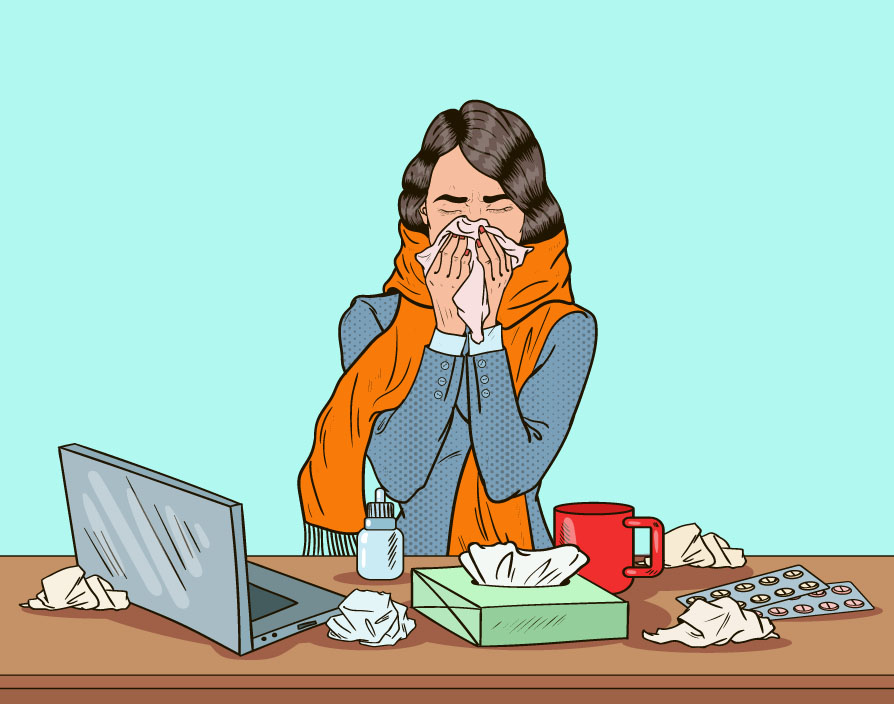Being proactive and enthusiastic at work is a great quality. It’s desired by many employers but seemingly employees are taking their health for granted, so what does that mean for the much-discussed subject of work-life balance? From organising summer dos with board games to embarking on trips overseas, companies have been introducing ways to keep their workforce healthy and motivated. Hence firms like Facebook, Airbnb and Netflix offer paid parental leave, free gym memberships and travel stipends to ensure workers don’t burn out.
But in the UK, where an average lifestyle is expensive, employees have been found commonly going to work while unwell. Figures released by the Office for National Statistics said sick leave taken by an employee has dropped to half compared to 25 years ago. Indeed, the average number of sick days taken annually was 7.2 in 1993 but this dropped to just 4.1 days in 2017.
Although many chiefs may think it’s better to have fewer absentees, it proves to be detrimental due to lack of productive hours by a sick employee. As a result, presenteeism is a bigger problem than absenteeism. “The always-on culture of the modern world is mostly to blame – we can all probably plead guilty of checking our phones, emails and social media in our down time,” said Kath Haines, CEO of CABA, a wellbeing association for chartered accountants, speaking with Elite Business. There’s no denying technology is a reason that employees are unable to unplug and take a breather when needed.
However, it’s in the employer’s best interest to ensure employees get sufficient days off when they’re even slightly unwell before everyone else in the workplace also succumbs to the illness. Those who are disengaged are more likely to be careless with their role and make more mistakes. Along with this, a loss of morale can often be as infectious as a cold. As a result, while business heads may think they’re getting the most out of their buck if the employee works irrespective of their physical health condition, they’re wrong. Colleagues coughing over their desk can cost circa £4,000 per annum for an employer said research from Nottingham Business School.
This workaholic attitude can be motivated by the fear of being critiqued by the colleagues and peer pressure. “[Most] UK workers claim their workplaces are affected by a culture of negative judgement around sickness absence,” said Mike Blake, director and wellness head for Willis Towers Watson, a risk management and advisory company. “This suggests that either there are problems with the policies and structures used to tackle sickness absence or issues with communication.”
In many cases, it may not be a specific disease but just fatigue or exhaustion after a heavy week. Apart from working while unwell, employees were staying back late just to get ahead of their deadlines. This trend was supported by research from AXA PPP Healthcare, the medical insurance company, which saw 47% of SME employees of 1,100 surveyed say they regularly work four hours of overtime per week – this will eventually lead to burnout. Not only does this culture of being on the brink of exhaustion spread the thought of demotivation among the entire team but also poses a threat to major mental health problems. Haines continued: “HR professionals have seen a rise in mental health issues in the workplace – demonstrating how much pressure people are increasingly under. For a country struggling with productivity, this must change.”
Head honchos need to include more communication and stress-free zones in the workplace. For instance employees at TransferWise, the money transfer service, regularly use the built-in office sauna and gaming consoles or sprawl on a hammock after a stressful meeting.
We’ve heard first-hand how various companies have had meetings while surfing or working out to ensure more staff engagement. Businesses like Dell, Apple and Amazon encourage remote working as a solution for a change in environment. “I recommend to my staff the use of mindfulness apps to help them unwind and look after themselves,” said Ian Blackburn, managing director of Hidepark Leather, a leather accessory company. Before the storm in a teacup becomes bigger and difficult to tackle, it’s best to nip it in the bud. “It’s crucial to keep an open dialogue between all employees, this way the environment you foster is one whereby staff are happy to discuss any issues they’re having before it becomes a larger problem,” said Blackburn.
Entrepreneurs should have an active role to understand what works best for the team — whether it’s providing complimentary nutritional advice or giving more annual holidays. “Often, the best wellbeing strategies are based on qualitative employee feedback,” said Haines. More millennial bosses have become conducive to creative ways for staff health. This is what compelled entrepreneurs to start companies like Doggy De-stress where dogs are brought to the workplace and every employee can get a slot to pet them. Apart from these occasional stunts, Haines advises bosses to ensure employees “chill out” to keep unnecessary problems at bay. “A much-needed break impacts our productivity as our brains need regular rest, so not letting it do this will result in poor concentration and performance,” she concluded. Boss or employee, when you’re at work, you’ve usually got your head down to focus on important tasks. Being able to take a break and talk about something other than work is a godsend.
Whether it’s Brexit and the aftermath of the recession leading people to be worried about redundancy or pressure to prove themselves among other employees — bosses need to loosen their grip when it comes to pulling a sickie. “Encouraging all members of staff to focus on results and not time is a key mindset to implement from day one,” Blackburn finished.![]()
Share via:


















































